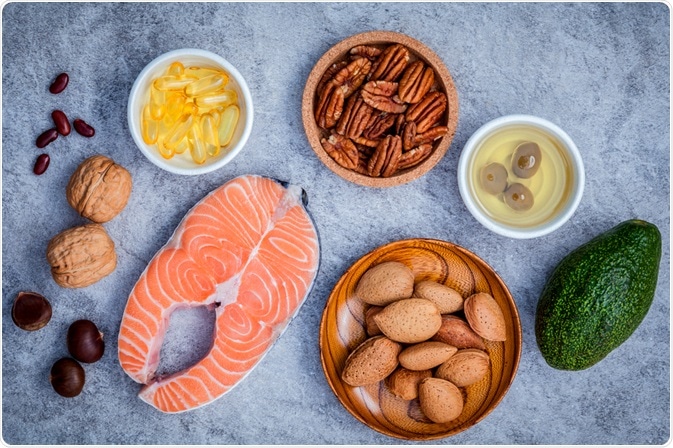Healthy High Fat Alternatives to Avocado

As a plant that contains approximately 15 grams of healthy fat per avocado, avocados are considered to be a healthy high-fat food. For those looking for alternatives, there any many other foods which boast similar benefits.

Kerdkanno | Shutterstock
What are the health benefits of avocados?
Avocado fruits’ fat is comprised of approximately 71% of high-monounsaturated fatty acids, 16% saturated fatty acids, and 13% polyunsaturated fatty acids. This combination of fatty acids promotes healthy blood lipid profiles and increases the bioavailability of fat-soluble phytochemicals and vitamins contained in foods that are subsequently eaten.
Phytochemicals help support health and wellness, and research suggests that they can reduce the risk of chronic disease. It has been shown that people who consume avocados regularly have higher high-density lipoprotein levels and lower weight and BMI levels compared to those who do not consume them regularly. However, there are many other high-fat alternatives to avocado with similar health benefits.
What makes a fat healthy?
Foods containing polyunsaturated and monounsaturated fat and are considered healthful. Research has shown that these types of fat are essential for cardiac health. Diets containing higher levels of polyunsaturated fat than saturated or trans fats are thought to lower levels of low-density lipoprotein (which is often referred to as bad cholesterol).
Tree nuts
Tree nuts, including almonds, pistachios, and walnuts, are thought to have similar nutritional and phytochemical profiles compared with avocados. Tree nuts are good sources of dietary fiber, protein, and unsaturated fatty acids, and they have also been found to reduce the risk of diabetes in women and coronary heart disease. To maximize the healthful effects from eating nuts, unsalted varieties should be chosen.
Fatty fish
Most fatty fish contain N3 long-chain polyunsaturated fatty acids (specifically eicosapentaenoic acid and docosahexaenoic acid), which play a vital role in brain development and cognitive function. Consumption of fatty fish, such as salmon, herring, and anchovies, can provide similar benefits to eating avocado.
Extra virgin olive oil and olives
Olive oil consists mainly of triacylglycerol, a fat that has been shown to play a role in the treatment and prevention of arterial hypertension, a rare form of elevated blood pressure. By extension, it is thought that regular consumption of olives can also confer these benefits.
Chia seeds
Chia seeds have gained popularity in recent years as they can easily be incorporated into existing diets. Due to high levels of α-linolenic acid, chia can provide a vital source of omega-3, which makes up 65% of the seed’s oil content.
Research has suggested that diets high in omega-3 fatty acids can boost the body’s physiologic function. Additionally, chia seeds can provide an essential source of antioxidants, specifically caffeic acid, quercetin, and myricetin which are all thought to have anti-aging, anti-carcinogenic, and cardio-protective properties.
Full fat yogurt
Research has shown that consumption of dairy products (including full-fat yogurt) is associated with protective effects against diabetes, obesity, and metabolic syndrome. Like avocados, full-fat yogurt contains a range of essential vitamins such as vitamins K, D, and A. Most who eat full-fat yogurt do so with fruit for a healthy breakfast.
Dark chocolate
Previously used for medicinal purposes, cocoa is said to contain more phenolic antioxidants than most foods, and 1 ounce contains 9 grams of fat. Considered by many to be an indulgent treat, dark chocolate consumption in moderation likely has greater benefits than risks. Regular intake is thought to stimulate pathways involved in immune response and can prevent nerve injury and inflammation.
There are many healthy high-fat foods and alternatives to avocado that can be easily incorporated into diets to provide a range of health benefits including reduced risk of cardiovascular disease and diabetes and improved brain function.
Sources
- Hass Avocado Composition and Potential Health Effects.
- Avocado consumption is associated with better diet quality and nutrient intake, and lower metabolic syndrome risk in US adults: results from the National Health and Nutrition Examination Survey (NHANES) 2001 – 2008.
- Avocado oil production and chemical characteristics.
- Nutritional and therapeutic perspectives of Chia (Salvia hispanica L.): a review.
- Health Benefits of Nut Consumption.
- Potential Health Benefits of Olive Oil and Plant Polyphenols.
- Essentials of Healthy Eating: A Guide.
- Dairy Fats and Cardiovascular Disease: Do We Really Need to Be Concerned?
- Cocoa and Chocolate in Human Health and Disease.
- Fatty fish intake and cognitive function: FINS-KIDS, a randomized controlled trial in preschool children.
Further Reading
- All Diet Content
- Low Calorie and Very Low Calorie Diets
- Diabetic Diet
- DASH Diet for High Blood Pressure
- High Protein Diet
Last Updated: Dec 19, 2018
Source: Read Full Article